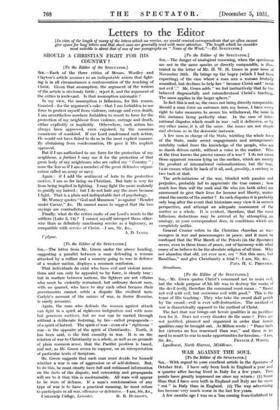[To the Editor of the SPECTATOR.] Sia,—The danger of analogical
reasoning, when the specimens are not in the same species or directly comparable, is illus. trated in the letter of Mr. H. W. H. Green in your issue of November 28th. He brings up the bogey (which had been expecting) of the ease• where a man sees a woman brutally assaulted, but declines to help her `.` -because Christ said .! resist not evil '." Mr. Green adds " we feel instinctively that he has behaved disgracefully and misunderstood Christ's teaching. The same applies in the larger sphere."
In fact this is not so, the cases not being directly comparable. Should a man force an entrance into my house, I have every right to take measures to secure his withdrawal, the issue in this instance being perfectly clear. In the case of inter- national disputes which result in war—call it defensive, or by any other name, it is all the same—the issues are not simple and obvious as in the domestic instance. • A few men in charge of the State, wielding the whole force of the State, make secret engagements and arrangements carefully veiled from the knowledge of the people, who are as dumb driven cattle, without a voice in the matter. Who at the time knows the precise causes of a war ? I do not mean those apparent reasons lying on the surface, which are merely the product of international rationalizations, but the true, tasic causes which lie back of it all, and, possibly, a century or two back at that.
The arch-initiators of the war, blinded with passion and prejudice, probably fail to appreciate the true -causes ; how much less then will the rank and file who (on both sides) are summoned to give their lives for honour and liberty, under- stand the merits of the matter ? In such disputes it is probably only long after the event that historians may view it in correct perspective, and attempt an adequate assessment of the matter as a *hole. It is evident, therefore, that the most fallacious deductions may be arrived at by attempting an analogy, as your correspondent does, in conditions which are completely unlike.
General Crozier refers -to the Christian churches as war- mongers in war and peacemongers in peace, and it must he confessed that the War March of the Priests (in the Spectator) seems, even in these times of peace, out of harmony with what many of us believe to be the absolute religion of all time. Why not abandon that old, yet ever new, cry " Not this man, but Barabbas," and give Christianity a trial ?—I arri, Sir, &c., PAUL H. C. PRENTICE. Streatham.










































 Previous page
Previous page